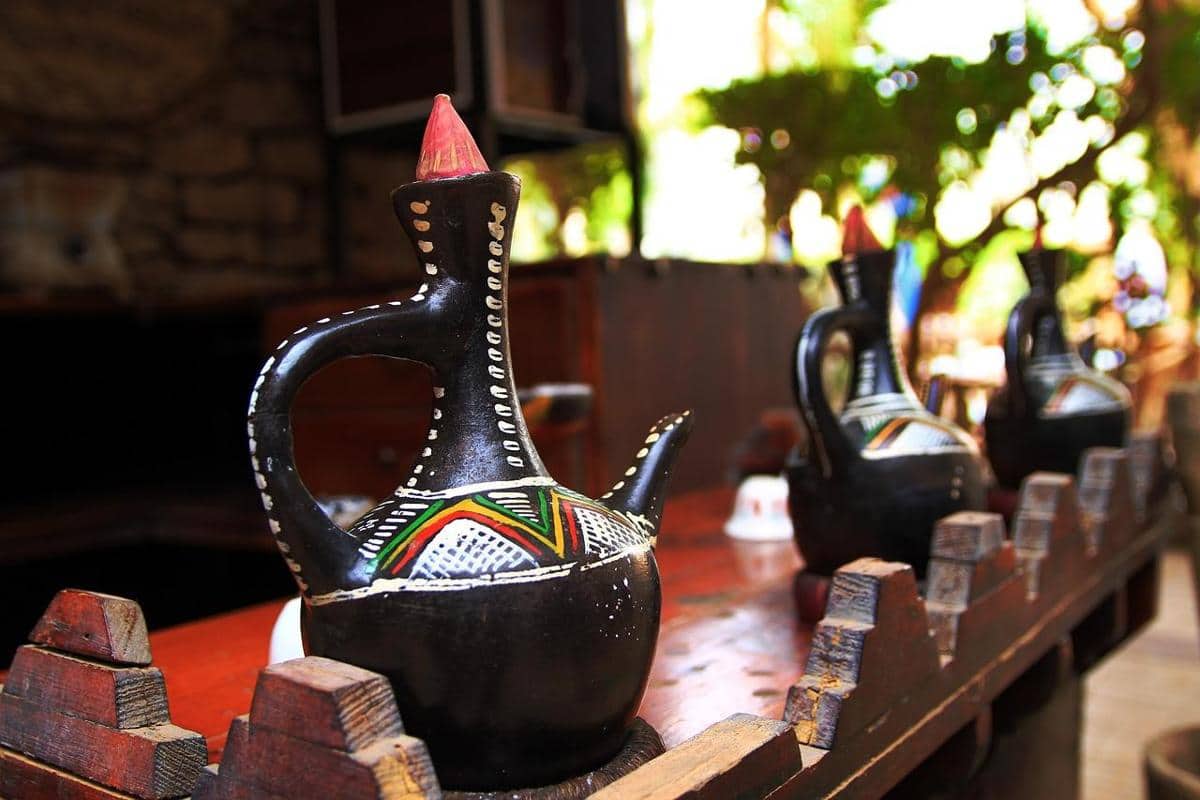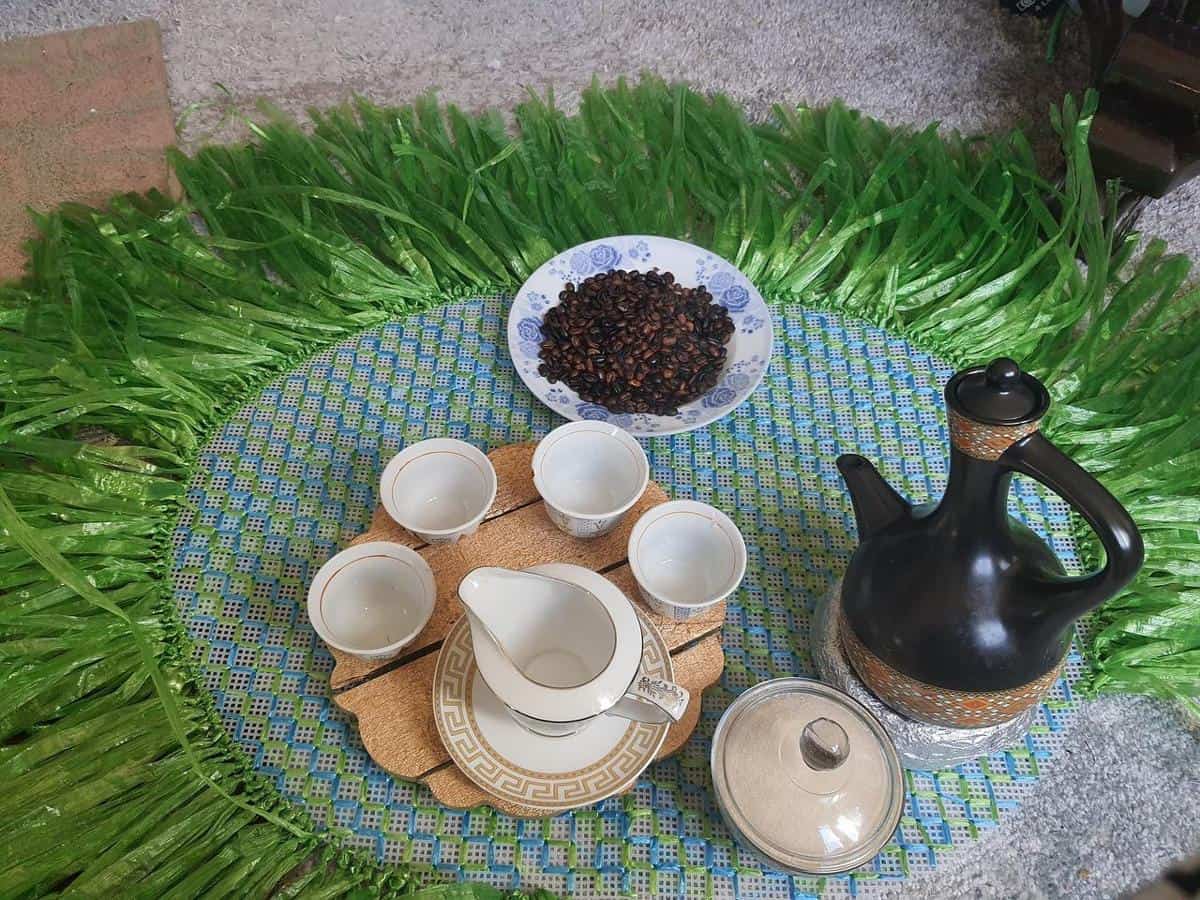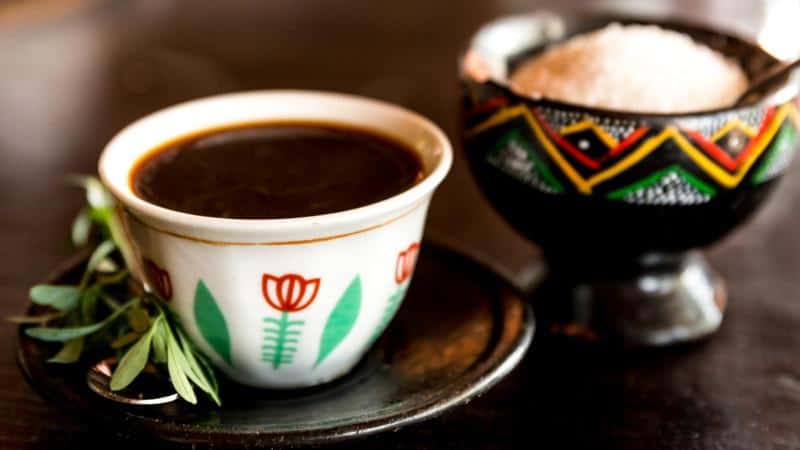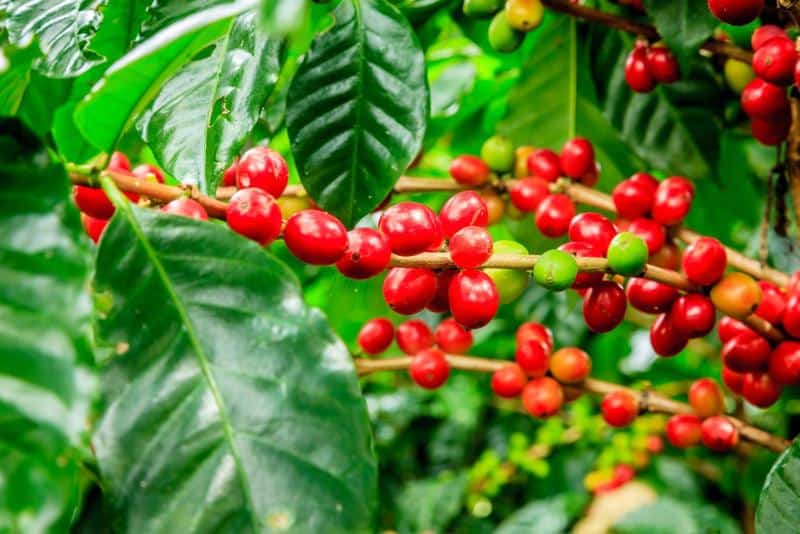Coffee enthusiasts around the world are drawn to the irresistible allure of Ethiopian coffee. Whether it’s the captivating aroma, the complex flavor profiles, or the rich cultural history, Ethiopian coffee has captured the hearts and taste buds of connoisseurs everywhere. In this article, we invite you to embark on a flavorful journey as we explore the enchanting world of Ethiopian coffee.
To truly appreciate Ethiopian coffee, one must understand its roots, both in terms of history and geography. Ethiopia is often referred to as the birthplace of coffee, with a legendary folklore surrounding its discovery by Kaldi, a goat herder. This tale sets the stage for our exploration as we delve into the fascinating origins and ideal growing regions in Ethiopia.
Furthermore, we will uncover the diverse range of coffee varieties found in Ethiopia, such as Harrar, Sidamo, and Yirgacheffe. Each variety boasts its own distinctive flavors and characteristics that contribute to creating an extraordinary cup of joe. From earthy notes to floral undertones, we will explore how these unique varieties elevate the overall experience of Ethiopian coffee.
Prepare to be captivated by the mesmerizing Ethiopian coffee culture through its traditional ceremony. This exceptional art form involves carefully roasting beans over an open flame and performing ritualistic steps to brew the perfect cup. We will immerse ourselves in this sensory experience and discover why it is such an integral part of Ethiopian society.
Get ready to awaken your senses and embrace the magic of Ethiopian coffee as we peel back layers upon layers of its history, flavors, traditions, challenges faced by growers and exporters alike, unparalleled experiences on picturesque farms ,and ethical sourcing practices that empower local communities. Let us guide you on this exhilarating journey where every sip tells a story – welcome to the enchanting world of Ethiopian Coffee Bliss.
Ethiopia
Delving into the legendary folklore of Kaldi
Ethiopia, often referred to as the birthplace of coffee, has a fascinating origin story that dates back centuries. According to legend, a goat herder named Kaldi discovered coffee after noticing that his goats became energized and restless when they nibbled on the cherries from a certain type of tree. Intrigued by this behavior, Kaldi decided to try the cherries himself and experienced a newfound sense of alertness.
Highlighting the ideal coffee-growing regions in Ethiopia
Ethiopia’s unique geography plays a significant role in its reputation as a premier coffee-producing country. Situated in the Horn of Africa, it possesses ideal conditions for growing high-quality Arabica coffee. The country’s varied microclimates, ranging from mountainous regions to lowlands, create diverse ecosystems that are well-suited for different coffee varieties.
Within Ethiopia, several regions stand out as prime coffee-growing areas. The Sidamo region, located in southern Ethiopia, is known for producing coffees with delicate floral notes and bright acidity. The Harrar region in eastern Ethiopia offers distinctive coffees with fruity flavors and a naturally processed wild character. Additionally, the Yirgacheffe region is celebrated for its washed coffees showcasing vibrant citrus notes and an elegant acidity.
These regions offer not only favorable climatic conditions but also rich volcanic soils and ample rainfall that contribute to the exceptional quality of Ethiopian coffee. For many farmers in these areas, cultivating coffee is not just an occupation but also an integral part of their cultural identity.
Ethiopian Coffee Varieties
Ethiopia is renowned for its diverse and unique coffee varieties, each offering a distinct flavor profile and aroma. From the fertile soils of Ethiopia’s coffee-growing regions, these beans make their way from the earth to your cup, providing a delightful and flavorful experience. Let’s explore some of the most popular Ethiopian coffee varieties and discover their characteristics.
Harrar Coffee: Bold and Winey
Harrar coffee is one of Ethiopia’s oldest and most prized coffee varieties. Hailing from the eastern highlands of Ethiopia, Harrar beans are known for their bold flavor and wine-like acidity. They often exhibit complex fruity notes with hints of blueberry, blackberry, and sometimes even spice or chocolate undertones.
The beans are dry-processed, allowing them to retain their natural flavors during the sun-drying process. Harrar coffee is typically medium to full-bodied with a lingering aftertaste that is both bright and satisfying.
Sidamo Coffee: Delicate and Floral
Grown in the Sidamo region in southern Ethiopia, Sidamo coffee is celebrated for its delicate flavors and floral aroma. These beans are wet-processed, resulting in a cleaner cup with bright acidity. Sidamo coffee showcases a wide range of flavor notes such as jasmine, citrus fruit, bergamot, winey acidity with a gentle sweetness. It has a medium body and a smooth finish that leaves you craving for another sip.
Yirgacheffe Coffee: Elegant and Vibrant
Originating from the Gedeo Zone in southern Ethiopia, Yirgacheffe coffee is known for its exceptional quality and distinct taste profile. This variety is meticulously handpicked by farmers before undergoing rigorous processing methods such as washing or wet-processing. As a result, Yirgacheffe boasts elegant flavors of lemon zest, sweet floral tones like jasmine or rose petals, along with a bright and effervescent acidity. It offers a light to medium body that is clean, vibrant, and often described as tea-like.
These Ethiopian coffee varieties represent just a fraction of the diverse range of flavors and characteristics found in Ethiopia’s coffee-growing regions. Exploring these distinct profiles allows coffee enthusiasts to delve into the rich tapestry of Ethiopian coffee culture and embrace the true essence of its flavors.
The Exceptional Art of Ethiopian Coffee Ceremony
The Ethiopian coffee ceremony is a mesmerizing and integral part of Ethiopian culture. It is a unique ritual that showcases the traditional art of preparing and serving coffee. The ceremony offers a glimpse into the country’s deep-rooted history and appreciation for coffee, making it an essential experience for any coffee lover visiting Ethiopia.
The coffee ceremony typically takes place in the home or a traditional coffee house, known as a “buna bet.” It is a social event where family members, friends, or neighbors gather to enjoy each other’s company while savoring the rich flavors of Ethiopian coffee.
The ceremony begins with washing and roasting green coffee beans over an open flame. This process allows the aroma of freshly roasted beans to permeate the air, creating an enticing atmosphere. Once roasted, the beans are ground using a mortar and pestle, resulting in a fine powder known as “kaffe finjal.” The host then brews the coffee in a special pot called “jebena,” which has a long neck and narrow spout for precise pouring.
As the aromatic brew simmers on hot coals, participants are treated to fragrant incense, adding another sensory dimension to the ceremony. Finally, once ready, the host carefully pours small cups of steaming hot coffee for each guest. It is customary for multiple rounds of coffee to be served, allowing time for conversation and connection.
Participating in an Ethiopian coffee ceremony is more than just drinking delicious coffee; it is about connecting with others and immersing yourself in their customs and traditions. This cultural practice highlights Ethiopians’ warmth and hospitality while also showcasing their long-standing love affair with this beloved beverage.
To fully embrace the experience of an Ethiopian coffee ceremony, visitors should seek out traditional cafes or local households in Ethiopia’s major cities such as Addis Ababa or Bahir Dar. These locations offer an organic setting to witness this ancient tradition firsthand and engage with the local community.
| Aspect | Description |
|---|---|
| Location | In the home or traditional coffee house (buna bet) |
| Process | – Washing and roasting green coffee beans over an open flame
|
| Ambience | Fragrant incense, lively conversation, and warm hospitality create an inviting atmosphere. |
Savoring the Bliss
Ethiopian coffee is renowned for its exceptional flavors and aromatic profiles, making it a favorite among coffee connoisseurs around the world. To truly savor the blissful experience of Ethiopian coffee, it is important to explore its diverse tasting notes and discover the perfect food pairings that complement its complex flavors.
Each Ethiopian coffee variety offers a unique flavor profile and distinctive characteristics that are a result of the specific region where it is grown, as well as the processing methods used. One popular Ethiopian coffee variety is Harrar, known for its wine-like acidity, fruity undertones, and bold flavor. Sidamo coffee, on the other hand, boasts a balanced acidity with floral and citrus notes. Yirgacheffe coffee is highly sought after for its delicate body, bright acidity, and floral aroma.
For those who appreciate the art of taste pairing, Ethiopian coffees can be perfectly accompanied by a variety of foods that enhance their flavors. The richness and complexity of Harrar coffee make it an ideal pairing with dark chocolate or dried fruits. Sidamo coffee’s smooth flavor profile with hints of citrus pairs excellently with pastries or baked goods. Yirgacheffe coffee’s floral aroma and bright acidity are beautifully complemented by fresh fruit or cheese.
To truly embark on a sensory journey through the delightful world of Ethiopian coffee tastings and pairings, it is recommended to experiment with different brewing methods such as pour-over, French press, or espresso. This allows you to fully appreciate the nuances in flavor and aroma that each variety has to offer. Additionally, exploring different roast profiles can also influence the taste experience – from light roasts highlighting delicate flavors to dark roasts bringing out bolder notes.
| Ethiopian Coffee Variety | Flavor Profile | Possible Food Pairings |
|---|---|---|
| Harrar | Wine-like acidity, fruity undertones, bold flavor | Dark chocolate, dried fruits |
| Sidamo | Balanced acidity, floral and citrus notes | Pastries, baked goods |
| Yirgacheffe | Delicate body, bright acidity, floral aroma | Fresh fruit, cheese |
Whether you are a coffee enthusiast or a casual drinker, exploring the different tasting notes and food pairings of Ethiopian coffee can elevate your coffee-drinking experience to new heights. Indulging in these delightful combinations allows you to fully appreciate the intricate flavors and cultural significance of Ethiopian coffee while immersing yourself in its rich history and traditions.
So grab a cup of Ethiopian coffee, savor the blissful experience it offers, and discover the perfect harmony between flavors as you embark on a flavorful journey like no other.
The Fair Trade Connection
Ethiopian coffee holds a special place in the hearts and cups of coffee enthusiasts around the world. Beyond its rich flavor profiles and cultural significance, Ethiopian coffee is closely tied to the concept of fair trade and its impact on empowering coffee farmers in Ethiopia. This section will shed light on the fair trade connection and how it positively influences both the quality and sustainability of the Ethiopian coffee industry.
Fair trade practices have gained momentum in recent years as consumers become more conscious about ethical sourcing and supporting farmers in developing countries. In Ethiopia, fair trade has played a crucial role in empowering coffee farmers by ensuring they receive fair prices for their produce and improving their living conditions. By eliminating intermediaries and establishing direct relationships between buyers and farmers, fair trade allows farmers to earn a livable income from their hard work.
One of the key benefits of fair trade for Ethiopian coffee farmers is price stability. Fair trade guarantees a minimum floor price for coffee, which acts as a safety net during times of market volatility or when global coffee prices drop significantly. This helps protect farmers from fluctuations in the market while providing them with financial security to invest in their farms, improve cultivation practices, or support their communities.
Furthermore, fair trade promotes sustainable farming practices that prioritize environmental conservation and protection. Coffee farmers who participate in fair trade are encouraged to use organic fertilizers, conserve water resources, minimize deforestation, and adopt sustainable agricultural techniques. By doing so, they not only preserve the natural ecosystems but also enhance the quality of their crops, resulting in better-tasting coffee beans.
Exploring the Ethiopian Coffee Industry
The Ethiopian coffee industry is not without its challenges, but it has also seen remarkable triumphs that have propelled it to the forefront of the global coffee scene. One of the main challenges faced by coffee growers in Ethiopia is climate change. Rising temperatures and increasingly erratic rainfall patterns have a direct impact on the quality and yield of coffee crops. This, in turn, affects the livelihoods of farmers who heavily rely on coffee production.
Another challenge faced by the Ethiopian coffee industry is access to markets and fair pricing. Many small-scale farmers struggle to navigate the complex international market, often facing exploitative middlemen who offer low prices for their beans. This further hampers their ability to invest in sustainable farming practices and improve their overall income.
Despite these challenges, the Ethiopian coffee industry has made significant strides in recent years. Initiatives such as fair trade certifications and direct trade relationships have empowered farmers and improved their economic prospects. Fair trade ensures that farmers receive fair prices for their beans while promoting environmental sustainability and social development within farming communities.
Furthermore, there has been a growing appreciation for specialty Ethiopian coffees worldwide, leading to increased demand and opportunities for Ethiopian coffee producers. The unique flavor profiles and exceptional quality of Ethiopian coffees have garnered attention from discerning consumers and specialty coffee shops around the globe.
Unforgettable Experiences
Embrace the true essence of Ethiopian coffee by embarking on a coffee-inspired adventure through the picturesque coffee farms of Ethiopia. These farms offer a unique opportunity to witness firsthand the cultivation, harvesting, and processing methods that contribute to the exceptional quality of Ethiopian coffee. Additionally, exploring the renowned cafes and specialty coffee shops in Ethiopia allows for a deeper understanding and appreciation of the country’s vibrant coffee culture.
When visiting Ethiopian coffee farms, travelers are treated to breathtaking landscapes that are home to some of the world’s finest coffee beans. The lush and fertile soil coupled with ideal growing conditions create an environment where coffee plants thrive.
At these farms, visitors can witness the meticulous care taken by farmers as they tend to their crops. From planting the young seedlings to harvesting ripe cherries at just the right time, every step is crucial in ensuring the quality and flavor of Ethiopian coffee.
Coffee enthusiasts can also learn about traditional Ethiopian coffee farming techniques, passed down through generations. Farmers often utilize organic practices, nurturing their plants without synthetic fertilizers or pesticides. This commitment to sustainable agriculture not only benefits the environment but also contributes to the distinctiveness of Ethiopian coffees.
After exploring the enchanting coffee farms, indulge your senses further by visiting some of Ethiopia’s renowned cafes and specialty coffee shops. These establishments serve as hubs for social interaction and are places where locals gather to enjoy their beloved beverage. Here you can experience firsthand the traditional Ethiopian coffee ceremony-an art form celebrated throughout the country.
Participating in a traditional Ethiopian coffee ceremony is a truly unforgettable experience. The ceremony involves various steps such as roasting green beans over an open flame, grinding them using a mortar and pestle, and brewing them in a traditional clay pot known as a jebena. The process is steeped in cultural significance and symbolizes hospitality, community bonding, and respect for tradition.
Ethiopian cafes also offer an opportunity to sample a variety of Ethiopian coffee types, each with its own unique flavor profile and characteristics. From the floral and wine-like notes of Yirgacheffe to the fruity and citrusy tones of Sidamo, there is something to suit every palate. Pair your coffee with traditional Ethiopian pastries or snacks, such as injera (a sourdough flatbread) or dabo kolo (spiced crunchy bread), for an authentic and delicious experience.
Conclusion
Ethiopian coffee is truly a magical experience that captivates the senses and delights the palate. Throughout this article, we have delved into the rich history, vibrant culture, and exceptional flavors of Ethiopian coffee. From its birthplace in Ethiopia to its significance in global coffee culture, Ethiopian coffee has a story to tell.
The journey begins with the discovery of coffee by Kaldi, the legendary goat herder who stumbled upon the energizing effects of these vibrant beans. This enchanting tale sets the stage for exploring Ethiopia’s ideal coffee-growing regions and the diverse varieties that flourish within their borders. Each unique variety, from Harrar to Sidamo, offers its own distinct flavor profile and aroma, enticing us further into the world of Ethiopian coffee.
One cannot fully embrace Ethiopian coffee without partaking in the traditional Ethiopian coffee ceremony. This mesmerizing ritual brings together the art of roasting and brewing to create a cup of exquisite perfection. As we savor each sip, we are transported to another time and place where community and celebration surround this cherished beverage.
Beyond taste and tradition, there is an important connection between fair trade practices and Ethiopian coffee farmers. By supporting ethical sourcing, we empower these farmers and their communities while ensuring the quality and sustainability of the industry. The challenges faced by this industry are significant but efforts are being made to overcome them and pave the way for a brighter future.
For those seeking an unforgettable experience, a visit to Ethiopia’s picturesque coffee farms and specialty cafes is a must. The chance to witness firsthand where these beans are grown and meet those who dedicate their lives to creating this liquid gold is an opportunity not to be missed.
In conclusion, embracing the magic of Ethiopian coffee means immersing oneself in its rich history, indulging in its exceptional flavors, supporting those who grow it sustainably, and experiencing it firsthand through exploration. Let us all raise our cups to Ethiopian Coffee Bliss – a true celebration of flavor, culture, and the enchanting traditions that make it so unique.
Frequently Asked Questions
What’s so special about Ethiopian coffee?
Ethiopian coffee is renowned for its exceptional quality and unique flavor profiles. It is often referred to as the birthplace of coffee, as it is believed that coffee originated in Ethiopia. The country’s diverse climate and rich fertile soil create ideal conditions for growing coffee beans with distinctive characteristics.
Ethiopian coffee is known for its intense and complex flavors, which range from fruity and floral to earthy and spicy. Its reputation has made it highly sought after by coffee enthusiasts around the world.
Is Ethiopian coffee high in caffeine?
Ethiopian coffee does contain caffeine, but the caffeine levels can vary depending on factors such as the specific variety of coffee bean, growing conditions, processing methods, and brewing techniques. Generally, Ethiopian coffees are not significantly higher in caffeine content compared to coffees from other regions.
However, some Ethiopian coffee varieties may have slightly higher caffeine content due to genetic factors or environmental influences. Ultimately, the overall caffeine content of an Ethiopian coffee will depend on various factors beyond its place of origin.
Why is Ethiopian coffee so expensive?
The price of Ethiopian coffee can be attributed to several factors. Firstly, Ethiopian coffee production predominantly involves small-scale farmers who grow and harvest the beans by hand. This labor-intensive process can contribute to higher production costs compared to large-scale mechanized farms in other countries.
Additionally, Ethiopia has strict regulations and controls in place to maintain high-quality standards for their coffee production and exportation processes. These regulations add expenses in terms of certification and licensing fees for both producers and exporters, which can affect the final price of the product.
What does Ethiopian coffee taste like?
The taste profile of Ethiopian coffee is diverse and depends on numerous factors such as the region where it was grown, variety of beans used, processing methods employed, and roasting techniques applied. However, there are some general characteristics associated with Ethiopian coffees that are valued by many enthusiasts.
They often exhibit a bright acidity accompanied by vibrant flavors that can range from fruity notes like berries or citrus to floral undertones like jasmine or honeysuckle. Additionally, Ethiopian coffees can have a distinctively clean and delicate mouthfeel with a pleasant aftertaste.
Is Ethiopian coffee healthier?
Ethiopian coffee does offer some potential health benefits. Like all coffee, it contains caffeine, which can provide a temporary boost in alertness and help combat fatigue. Coffee also contains antioxidants that may support overall health and reduce the risk of certain diseases.
However, the specific health benefits of Ethiopian coffee are not unique compared to coffees from other regions or origins. The overall healthiness of coffee consumption depends on individual factors such as quantity consumed, brewing methods used, and any additional additives or sugar included. It is important to note that excessive caffeine intake or the addition of unhealthy ingredients can diminish any potential health benefits associated with coffee consumption.










